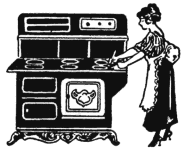Hoosier Homemakers
This page was created January 25, 2004 The early pioneer homemaker did not have to be reassured that she was needed..IT WAS A FACT OF LIFE! Farms and small towns were isolated and self contained. In the rural household,there was a complex interdependence in which the homemaker was essential to the whole. The households themselveswere generally large, consisting of mother, father, many children, perhaps a grandparent or unmarried aunts or unclesor orphaned cousins. To this was occassionally added the hired man or girl. Members of the family worked together as asmooth running unit each having an important role to play. Mother, Father and children all had their own responsibilities. Even though the miles were long when only horse drawn conveyances were used; company was frequent as communities depended on their neighbors for entertainment and visited more often. Perhaps, most especially, when there was work to be donethat required several hands such as butchering day, barn raising or cane stripping. However, many of these events, even social onessuch as a church picnic required much work on the part of the rural housewife, before she could enjoy the festivities.Many times though in historical writings, it is found that reference is made to these gatherings by the women as "such a good time". Theyexpected labor or life to be hard-- but tempered that labor with good times and humor if they could. "Basic" or Everyday Duties of the Pioneer Wife Below is the everyday tasks expected of the woman of the household--any slacking in these areas, let it be known to others that she was a "bad housekeeper", so in many cases, pride and community opinion may have kept her going... Care of her family; plus care of the home and garden was generally the province of the homemaker. She planted the garden; and canned the produce; picked the fruit in the orchard and dried it; milked the cow and churned the butter; raised the chickens and gathered the eggs. In addition, she cooked the meals and baked the bread; she cleaned and swept; washed and ironed; bore and raised the children. Her home remedieskept the family healthy and she participated in community life fully.IF she were thrifty and hard working, she could sell enough excess butter, cream and eggs to pay for shoes for the children or fabric to make the family's clothes. In addition to her household chores, many women helped at times with the farm work. She was always available for short time chores such as leading thehorse to pull up forks of hay. It is not surprising that the widower married again very soon. His choice was often that or breaking up his family, since the household then required a functioning full time homemaker to do many of the chores. It is difficult to realize in our time- the amount of hard, physical labor which was required on just a daily basis. Water had to be carried into the home from outdoor wells or springs. Laundry was done by scrubbing clothes on a washboard; Fuel for wood or coal cookstoves were carried in and the ashes were carried out. Milk was carried in buckets to the house for straining and skimming and then the skim milk carried back out to the pigs. Most chores involved lifting, carrying, digging, pumping or pouring. Even the leisure activities required work on the part of the homemaker. A picnic involved killing, dressing and frying the chicken and baking the cake or bread. In those days, children were many (average 8-12), so even a simple family meal with no guests required much cooking. They cooked 3 meals a day for 15-16 persons, when today for us, this might be onlya special occassion gathering.Since these families were large though and the homemaker was quite frequently "with child"; she did have help readily at hand. As soon as children were old enough to understand-- they all had theirchores and they were expected to do them. Any other members of the extended family would also expect to help. A grandfather too old to work in the field, might take on the responsibility of the garden.A neighbor girl who had graduated school, but not yet married was available as a hired girl. But the main responsibility of the home was the homemaker herself. Most areas of "gracious living" were out of their reach. However, the homemakers did work with what they had.Some of the mills at the time, put out their flour or feed in printed sacks. These served to later make curtains or dresses. Embroidered pillowcases were made from the bleached flour sacks.Flowers were tucked into various areas of the garden.. this satisfied their need for beauty. Memories Above are just some of the local memories, as I have more submitted to me, I will break them into subject matter. Home Website Coordinator
